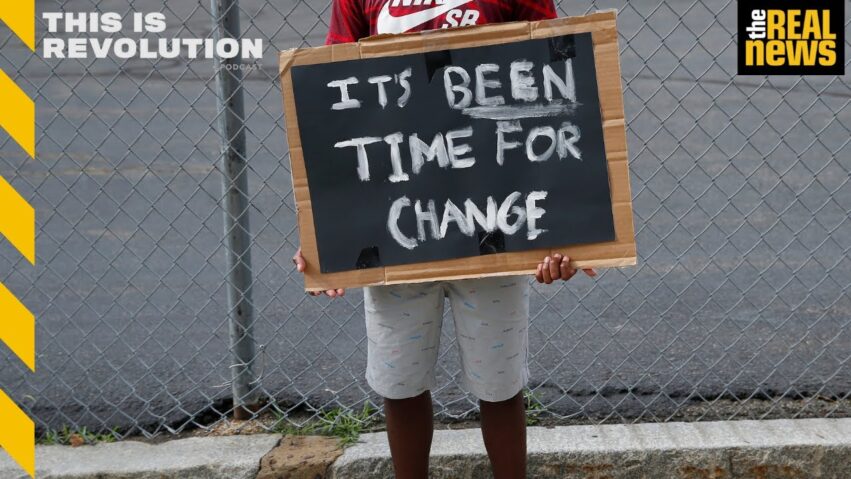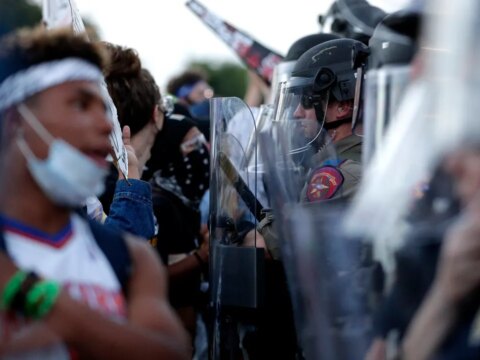“There is no doubt that racism is real and has negative consequences for people’s lives,” Adolph Reed Jr. and Touré F. Reed note in the abstract to their article “The Evolution of ‘Race’ and Racial Justice under Neoliberalism.” “This is why we have consistently argued for the continued value of anti-discrimination policies. But race reductionism’s insistence on uncoupling disparities from political economy lends itself to individualist reforms (anti-racism training and swelling the ranks of black capitalists) as responses to structural ailments. We must reject race-reductionist analyses and refuse to accommodate charges that a left focused first and foremost on critique of and challenge to capitalist political economy as such, with its corrosive human consequences, is unacceptably ‘class reductionist.’”
What is race reductionism and how does it close off possibilities for liberational politics? How is it that we’ve come to have such a restrictive understanding of race, culture, identity, and “authenticity” today? How have the political, economic, and ideological changes to society that comprise what we call neoliberalism created a situation where discussions of race and racism are divorced from analyses of class and “capitalist political economy”?
As part of a new collaboration between The Real News Network and the podcast THIS IS REVOLUTION, co-hosts Jason Myles and Pascal Robert speak with scholar and activist Adolph Reed Jr. about the genealogy of American conceptions of race and racism, and about the folly of fighting neoliberalism on neoliberalism’s own terms. Adolph Reed Jr. is Professor Emeritus of Political Science at the University of Pennsylvania, a longtime activist, scholar, and commentator, and the author of numerous books, including: Class Notes: Posing as Politics and Other Thoughts on the American Scene; Stirrings in the Jug: Black Politics in the Post-Segregation Era; and The Jesse Jackson Phenomenon: The Crisis of Purpose in Afro-American Politics.
Pre-Production/Studio: Jason Myles
Post Production: Cameron Granadino
Help us continue producing radically independent news and in-depth analysis by following us and making a small donation:
Donate: https://therealnews.com/donate-yt
Sign up for our newsletter: https://therealnews.com/nl-yt
Like us on Facebook: https://facebook.com/therealnews
Follow us on Twitter: https://twitter.com/therealnews
** (Disclaimer: This video content is intended for educational and informational purposes only) **






















Thought too often can become consumed by language, and comes to mean any range of self serving options.
I asked Chat GPT(the machine) this question:
“What does culture mean amongst humans >
?”
The reply was:
“Culture refers to the beliefs, customs, habits, traditions, language, lifestyle, and expressions of a particular group of people. It is the patterns of behavior and thinking that people living in the same social, racial, ethnic, or geographic group share. Culture influences how people dress, talk, act, and solve problems, as well as how they interact with each other and the environment.”
Keywords here are, “a particular group of people.”
Continuously babbling about “white and black” people, in my mind is just continuously cosigning European race theory
Who are African Americans, Who are Asian Americans what Who are European Americans?
A "monolithic Black politics" should obviously be seen as a misnomer, because there is no governance structure that regulates Black people's behavior, nor one that can be used to reach a consensus on anything. Reed implies "race" is not a thing, and therefore is not important, but how many Black people don't see Blackness as a real thing? It is real largely, if not totally, in the sense that it is the antithesis of Whiteness. As much as many Black intellectuals like to be critical of Black people who do what they call "practicing respectability politics" and seeing ourselves and things through the "White gaze", or White people's eyes", they too can't escape the reality that their self identity, is largely externally formed, and not internally created or affirmed.
So, Reed is being technical, when he says race doesn't exist. That is like saying ethnicity doesn't exist, or is invalid, as some White Conservatives expressed, when the issue of Black-Americans calling themselves African-Americans came about. They tried to say hyphenated Americans was invalid, and that we are all Americans. These same people no doubt, have no problem going to eat at an Italian or Chinese- American restaurant.
"Race relations" is what Mr. Neeley Fuller Jr. and the late Dr. Francis Cress Welsing addressed in their work. It focuses on the dynamic of power, or more specifically the power Whites have over Black people. That is the fundamental nature of the relationship. Something has to fill the void left by the fractured dysfunctional nature of Black people, as a group. Intellectuals occupy this space by default. They largely have no substantive association with the masses of Black people. Black politicians have an association, but even that is limited, in that so many Black people, like all Americans, don't involve themselves much in politics. Another default group is the activist, who like to think our themselves as being a part of "the people", but their level of involvement separates them from "the people", who again are largely uninvolved in politics, or even many other social matters. This is the default handicap that the Left, especially the radical/progressive or socialist Left has, but show little appreciation for.
Glenn Greenwald "produces stuff for the police?" What does that mean?
Does anyone know where I can get that article they mention at the beginning? I hope it’s not some pay yo read bs.
I can see why Adolph gets into hot water from time to time, but he's great!
Ask her for her federal reservation card or blood quantum report because that’s how the bureau of <insert race> affairs does it. I think the elders encouraged the white emcees do land acknowledging to show the working class how the upper class uses disinformation such as relocation instead of invasion and reorganization instead of occupation. The question of reservation gun factories is ootq closer to home airports or right on the money class action for genocide land, it’s what america fears most and the reason there is a Marshal decision in Johnson versus Macintosh 1823. (King Henry’s white land owning males entitled by discovery coincidentally 4 years after Columbus). I like to blame all racism in america on this.
Very interesting, I think that his point about culture is the traditional leftist position which is basically the exact opposite of the contemporary “woke” position on culture.
Brilliant interview, thank you.
"Glenn Greenwald" happens to produce for the police – ? I write this with no punch delivery or conceit or sarcasm I just have a genuine question as to what he is saying. I know I need to couple it with the few sentences before that and it seems like he's saying the dark forces don't even need to employ cultural-political saboteurs, they come about organically, but is tying Glenn to this a joke inside of a joke? I don't understand how Glenn has ever been a race-reductionist or class unaware, can someone please tell me if I need to know how he has been, or if I'm just really not parsing any of this correctly? I really don't understand what Reed is saying in that line, can anyone help me?
Brilliant discussion and very relevant to many of us here in Ireland, dealing with many forms of domestic colonialism.
RACE The Only Race WE need to Worry about is the HUMAN RACE!!!!!!!!!!!
If We cannot LOVE One other Worldwide We are DOOMED!!!!!!!!!!!!!
THE END
should've been the analysis news :/
Great interview, as always, comrades! Side note, I just noticed that JM's laugh is very Vincent Price-esque. I challenge you to not listen to it and not think you're watching the end of the Thriller video.
Adoph Reed and son Toure have helped me understand what's going on with the broad left today and in particularly distinguishing between race and class based approaches. I wonder what Adoph and Toure say about Reverend Barber of the Poor People's campaign. He's one of the few leaders on the left who consistently emphasizes that we'll only get progressive change in this country through a mass multi-racial movement, black, white, brown, Asian and native American.. Is there any way to direct questions to either of them?
Does Adolf have a critique … or any thoughts … on the Black consciousness movement or Steve Biko's thoughts, brief and locked in early development as they were.
Wow great conversation, I’d love to get more info on the various different takes on black American movements their goals/perspectives and what different people see as their as the strengths and weaknesses of those perspectives. Just to not lead any up the garden path I’m an interested Irish man not an American
Can't stand this kind of jocular circle-jerky discourse. Reed says at the end it's an upgrade TO TRNN not for, you fools.
Reading the black bourgeoisie by E. Franklin Frazier cuz it helped understand Black American class consciousness & it’s importance. And how black businesses & black capitalism is not the come up many think. Dope video with much needed critical info.
Great discussion, educational and entertaining too. But what's that about Glenn Greenwald and the police?